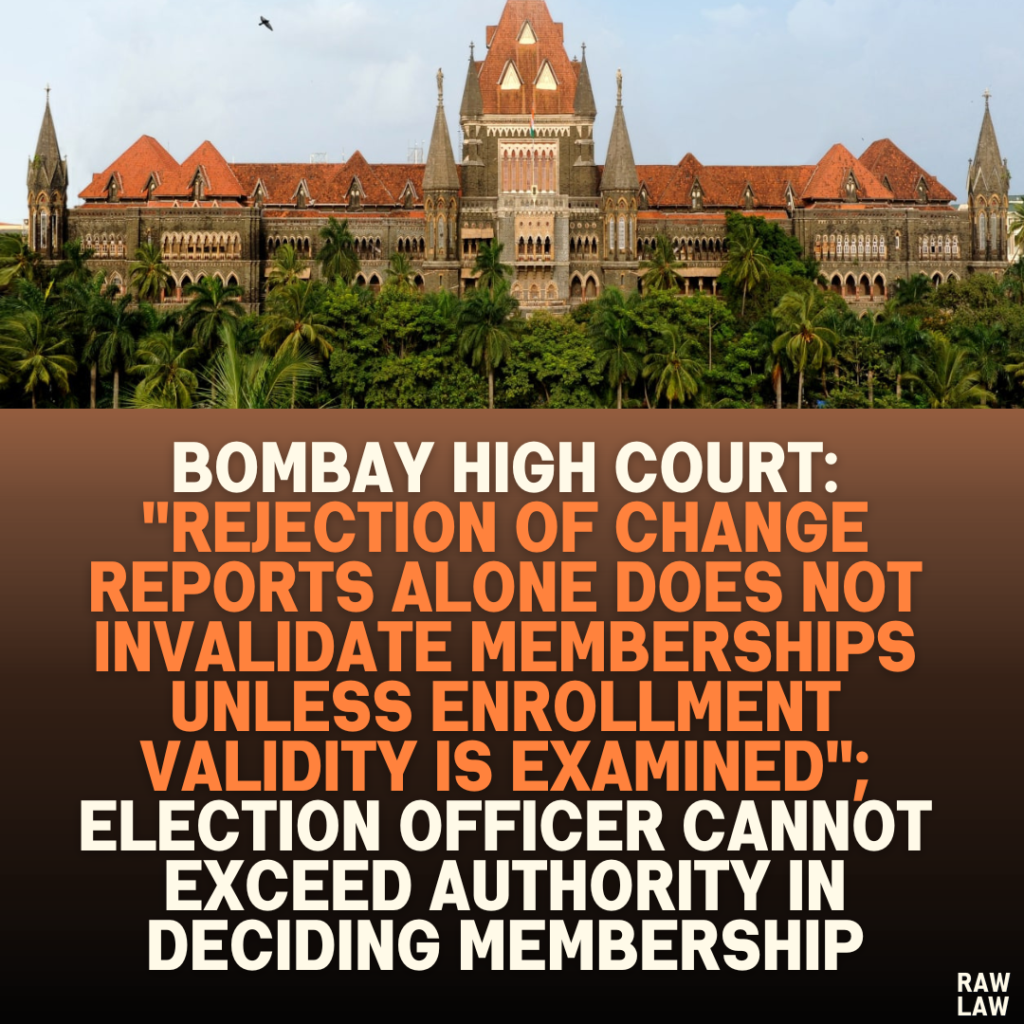Court’s Decision:
The Bombay High Court ruled that the rejection of Change Reports (which pertain to trust governance changes) by the Deputy Charity Commissioner does not automatically strip members of their membership rights. Membership validity must be examined independently and cannot be presumed invalid solely because the Change Reports were rejected. The court held that the Election Officer exceeded his authority by excluding the petitioners from the voters’ list without proper adjudication of their membership status.
Facts of the Case:
- Background of the Trust:
- The charitable trust in question, established in 1956, runs several schools and colleges in Kolhapur.
- It is governed by a Governing Council elected every three years by the trust’s members.
- Issues with Elections:
- Since 1999, the Governing Council elections have faced procedural irregularities.
- Change Reports, which report new office-bearers to the Deputy Charity Commissioner, were consistently rejected due to procedural lapses like improper service of notices or lack of compliance with the trust’s constitution.
- Petitioners’ Situation:
- The petitioners were members enrolled after May 16, 1999, during the tenure of Governing Councils whose elections were not accepted through Change Reports.
- The Election Officer excluded these members from the voters’ list for the 2025 elections, citing the rejection of Change Reports.
- Earlier High Court Decision:
- In a prior case, the High Court set aside an order excluding members enrolled after 1999, stating that their membership validity should be decided in appropriate proceedings, not summarily.
Issues:
- Does the rejection of Change Reports invalidate the membership of individuals enrolled by the Governing Councils in question?
- Can the Election Officer, who is tasked with preparing voters’ lists, decide on the validity of memberships?
Petitioner’s Arguments:
- Election Officer’s Jurisdiction:
- The Election Officer acted beyond his authority by determining membership validity. This issue can only be decided through appropriate legal proceedings under the Bombay Public Trusts Act.
- Previous High Court Ruling:
- A Division Bench had earlier ruled that the exclusion of members enrolled after 1999 was improper. This ruling was ignored by the Election Officer.
- Validity of Membership:
- The petitioners argued that their enrollment was done legally, with the approval of the trust’s General Body. Rejected Change Reports did not invalidate their membership since the validity of their enrollment was never adjudicated.
Respondent’s Arguments:
- Effect of Rejected Change Reports:
- The respondents argued that the rejection of Change Reports automatically invalidates all actions of the Governing Councils, including the enrollment of new members.
- Membership Invalidity:
- The membership of individuals enrolled after 1999 was directly linked to the rejected Change Reports, making their inclusion in the voters’ list improper.
- Integrity of Elections:
- Allowing disputed members to vote would undermine the trust’s election process and violate the principle of fair governance.
Analysis of the Law:
- Jurisdiction under Section 22 of the Bombay Public Trusts Act:
- The Deputy Charity Commissioner has the authority to examine the validity of membership enrollments during the inquiry into Change Reports.
- However, in this case, there was no evidence that the Deputy Charity Commissioner had reviewed the validity of the petitioners’ enrollment.
- Key Judgments Referenced:
- Krishnarao Kanhaiya Naidu v. Jeevraj Bhairavlal Agrawal: Held that rejection of a Change Report does not invalidate actions taken by a governing council unless the membership’s validity is specifically adjudicated.
- Laxman Baburao Avale v. Surendra Agarwal: Confirmed that membership validity can be reviewed during Change Report inquiries, but only if contested.
- Election Officer’s Role:
- The court emphasized that the Election Officer’s role is limited to preparing voters’ lists based on existing membership records and that the officer cannot decide on the legality of memberships.
Precedent Analysis:
The court highlighted that previous rulings confirm:
- Rejection of Change Reports does not automatically invalidate all actions of the governing body.
- Membership validity must be adjudicated separately, and such adjudication requires jurisdiction under the Bombay Public Trusts Act.
Court’s Reasoning:
- Improper Exclusion of Petitioners:
- The court noted that the Election Officer excluded members without jurisdiction and without any adjudication of their membership validity.
- Impact of Rejected Change Reports:
- The rejection of Change Reports primarily invalidates the election of the Governing Council but does not automatically annul memberships unless their validity is explicitly questioned and examined.
- Consequences of Automatic Invalidation:
- The court cautioned against the blanket invalidation of memberships based on rejected Change Reports, as it would disrupt the trust’s operations, including decisions related to staff appointments and governance over the past two decades.
Conclusion:
The court ruled that:
- The petitioners’ exclusion from the voters’ list was improper.
- The issue of membership validity should be adjudicated in appropriate proceedings under Section 22 of the Bombay Public Trusts Act.
Implications:
- This ruling protects members’ rights by ensuring that their membership cannot be invalidated without proper adjudication.
- It clarifies the limited jurisdiction of Election Officers and reinforces the Deputy Charity Commissioner’s role in adjudicating membership disputes.
- It provides a framework for balancing the need for fair governance with the trust’s operational stability.
